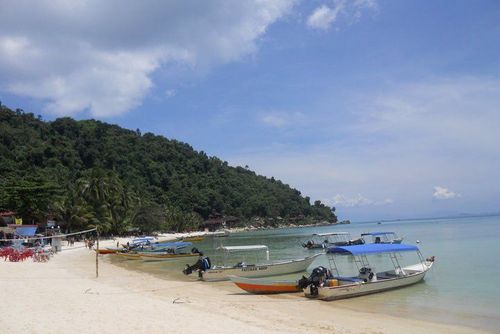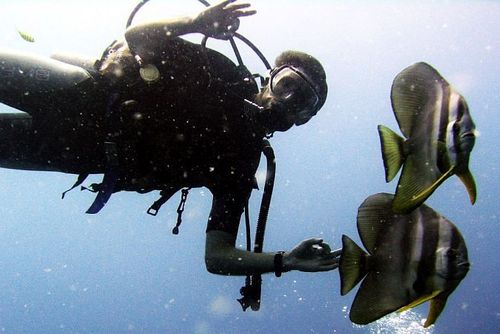Situated in the stunning island paradise of Pulau Kecil in the Perhentians, just off the north-eastern coast of peninsular Malaysia, this exclusive project centres its efforts on helping to conserve and protect the turtles that live, nest and feed around the Perhentian Islands.
The project has 3 main focus areas including; seagrass mapping to help understand which turtles and other marine life feed off of the coast of the islands, artificial reef assessments to enable sustainable fishing by locals in the hope of reducing the pressures on the natural reefs, and coral reef mapping to better understand what corals there are in the region and to see the effect the monsoon has on them.
As a volunteer you will spend time focusing on 1 of these areas if you are joining for a short period of time or all of them if you are staying for longer.
It is also important to note that a large part of the research is conducted through survey dives, and so a portion of this project is set aside for you to take a PADI Open Water or Advanced Open Water scuba diving qualification. After completing this, you will work directly with the project team and assist on the research dives
Itinerary
Day 1
You'll arrive at the Kuala Besut Jetty where a member of the in-country team will meet you, and you'll then be transferred to the local fishermans village in Palau Perhentian Kecil. After lunch it is time for a PADI scuba diving orientation and briefing before some time in the water to help build your confidence. You've then got free time to settle in before enjoying dinner and learning a little more about the project.
Day 2-7
You will spend this time undertaking a PADI Open Water Diving Qualification, or Advanced Qualification. Mornings will be spent learning theory and the afternoons will involve buoyancy training and mock survey dives.
Day 8-14
Training Week - After having completed your PADI Dive Qualification you will focus on 1 type of research, it maybe seagrass surveys, coral reef mapping or artificial reef surveys. Before taking part in this you will spend time training and understanding how to collect data so that you can contribute as much as possible.
Day 15 - 20
This is a research week and having completed your training this week you will get stuck into the research. The research you will be conducting will depend on the schedule, but it could be seagrass mapping, coral reef surveys, or assessing the current artificial reefs around the islands. No matter what type of research you do, you will focus on 1 or 2 dives in the mornings with the afternoon clear for further dives or data input and analysis.
Day 21
Today will be you last day so after some fond farewells you will take the boat back to Kuala Bessut where you will travel home or continue your independent travel plans.
Saturdays and Sundays
Every Saturday the project takes part in awareness campaigns. These could be anything from joining other dive centres with reef clean ups, doing our own beach clean ups or giving Eco Snorkel briefings to groups of snorkelers (research has shown that when briefings are given before snorkelling and diving it reduces damage caused by more than 60%).
Sunday is a day to relax with volunteers often relaxing on the beach, visiting another bay on the island or reading a book in a hammock etc.
Project Activities
On this project you will get the chance to take part in a wide variety of exciting activities. Below are examples of some of those included in this project.
Scuba-Diving Course
Beginners complete a PADI Open Water Qualification, and those already qualified for open water, a PADI Advanced Qualification. This is optional however, so if volunteers arrive and are already qualified, they can get straight into the marine conservation volunteer work after a day’s training.
Training Week
During your training week you will take part in both practical and theory lessons. You will spend the mornings learning theory, for example learning about different types of substrate and how to record them, and then after lunch you will do a practical session which will first involve some buoyancy training and then a mock survey. During the week you will have 4 days of practice and theory which will end in a practical exam and also 2 additional dives to improve your buoyancy.
Research - Seagrass Mapping and Survey
The seagrass beds are very important as feeding grounds for the sea turtles in the Perhentian Islands. However, the seagrass beds around the islands have never been studied and we therefore do not know where they all are, which is why they need mapping thoroughly. If you join this activity during your research week/s you will help to identify the boundaries of the seagrass beds and swim around them with a GPS to help us map them out. You will also help us to conduct a percentage cover survey using the global standard method of Seagrass Watch.
Research - Coral Reef Mapping
Like the seagrass, the coral reefs of the islands are not fully mapped and before any management decisions can be properly made we need to know where the reefs are and what types of corals make them up. You will learn the Transect intercept method, whereby you follow a transect line and record the start and end of a type of substrate – ie corals such as boulder, staghorn and table etc. The mapping will be repeated for all the reefs around the islands and repeated twice annually to assess the difference before and after the monsoon.
Research - Artificial Reef Assessments
The marine parks sunk several structures on the boundaries of the marine park to act as new fishing grounds where the villagers can fish, reducing the pressures on the natural reefs where the villagers currently fish. These structures were sunk in 2013 and need to be assessed for fish quantities and health before they are opened for fishing. You will help to conduct fish counts and video transect surveys to help our researchers to assess the FADs (Fish Aggregating Devices).




